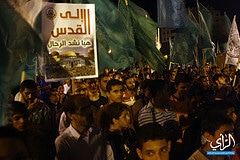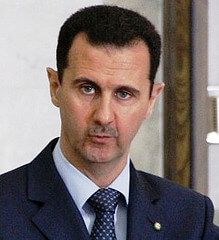The horror of terrorism again shook the world this week, as the Beslan slaughter of innocents revealed another nation under siege by cold-blooded killers. Russian President Vladimir Putin immediately linked the Beslan attack to ‘the worldwide network of terrorism’ and demanded a more determined response to the threat: ‘We showed weakness, and the weak are beaten.’

How must the free world now exhibit strength? Though news reports generally fail to convey just how, political and intelligence leaders acknowledge that a key requirement is uprooting that worldwide terror network which uses the nation of Syria as a central hub of activity.
Syria, since 1979 a perpetual member of the U.S. State Department’s list of nations sponsoring terrorism, continues ‘to provide political and material support’ to Hamas and ‘to permit Iran to use Damascus as a trans-shipment point for resupplying Hizballah in Lebanon.’
Earlier this year, a leading Syrian dissident and the former head of the coalition’s hunt for Iraq’s WMDs claimed that part of Saddam Hussein’s chemical and biological weapons were hidden in Syria. Additionally, a number of Iraqi officials including members of Saddam’s family were granted refuge in Damascus after the collapse of the Iraqi dictator’s regime, and many of the foreign fighters responsible for attacks against coalition troops are believed to have entered Iraq through Syria.
In a comprehensive report on Syrian support of Hamas in Israel, Gary Gambill, editor of the Middle East Intelligence Bulletin, summarized:
Since the mid-1990’s Damascus has been the operational headquarters of the Hamas military wing and a nexus for the transfer of external funds to Hamas operatives in the territories. Syria and Syrian-occupied Lebanon have become major conduits for funneling weapons and explosives to Hamas and safe havens for training hundreds of its operatives… most of the deadly Hamas suicide attacks [of 2001-2] have been linked to Damascus.
And the Syria-Hamas link remains in place. In the aftermath of last week’s double suicide bombing in Be’er Sheva, Israeli Army Chief of Staff Lt. Gen. Moshe Yaalon pointed an accusatory finger at the Hamas leadership in Damascus, which most likely directed the attack: ‘Anyone responsible for terror against us shouldn’t sleep soundly at night.’
ANTI-ISRAEL CAMPAIGN
Syria has long made opposition to Israel and the democratic West a top priority. When the U.N. Security Council overwhelmingly voted in favor of a December 2002 resolution condemning the al Qaeda-led hotel bombing in Kenya and the attempted missile attack on an Arkia Israeli Airlines flight, Syria voted against the resolution. Why? The Syrians ‘could not accept the repeated mention of Israel in the text.’
Syria has waged three wars against Israel, invaded Israel’s borders, supported Hizballah terrorists in southern Lebanon for nearly three decades, and as documented by Gambill, Eyal Zisser, Amos Gilad and others actively enabled ongoing terror against Israeli civilians via Hamas and Islamic Jihad. Hamas’s top political leader, Khaled Mashaal, lives in Damascus under the protection of the Syrian regime.
The Syrians have a stockpile of ballistic missiles about ten times that of the Iraqi arsenal under Saddam Hussein, and have proximity and geography on their side. Former Israeli defense minister Moshe Arens concluded in 2002 that in the immediate future, ‘the [missile] threat that Israel most likely will have to contend with’ is that of Syria.
OCCUPIED LEBANON
But Syria a totalitarian, Stalinist regime since 1963 is not just a neighborhood bully toward Israel. The Syrians have maintained over 17,000 troops within Lebanon since 1976, when Syria shuffled its military across the border to help quell a year-old Lebanese civil war (which continued for another 15 years). Since then, Syria has dominated Lebanon’s politics and controlled that nation’s official structures, all the while claiming its presence was necessary to ward off ‘radical action emanating from Israel.’
But this rationale is clearly absurd. In 2000, Israel withdrew its forces from southern Lebanon, in fulfillment of its obligations under U.N. Resolution 520 to respect ‘the sovereignty, territorial integrity, unity and political independence of Lebanon under the sole and exclusive authority of the Government of Lebanon through the Lebanese Army throughout Lebanon.’
‘the sovereignty, territorial integrity, unity and political independence of Lebanon under the sole and exclusive authority of the Government of Lebanon through the Lebanese Army throughout Lebanon.’
Unshaken in its resolve to control Lebanon, Syria has remained the power broker there. Just last week, Syria won a political victory as Lebanon’s puppet parliament put off real elections, and instead pushed through a constitutional amendment that extends the expiring presidential tenure of Syrian lackey Emile Lahoud by a full three years. As Boston Globe editors wrote, ‘Syrian bosses made a mockery of Lebanese independence.’
Finally, the United Nations has said ‘enough.’
By a vote of 9-0 with six abstentions, the U.N. Security Council moved on Thursday (Sept. 2) to block Lahoud’s false appointment, and once again called for ‘free and fair presidential elections’ to restore Lebanese sovereignty. The precursor of this determined expression of international discontent was the United States’ own ‘Syria Accountability Act,’ passed in May of last year, which placed sanctions on the Syrian regime for failing to fulfill its obligation to cease occupying Lebanon.
But Syrian leader Bashar Assad’s cronies in the Lebanese Parliament ignored the U.N. motion on Friday (Sept.3), and as The New York Times reported, ‘rubber-stamped Syria’s order to keep its handpicked president in office.’
The implications of this matter reach far beyond Lebanon’s shores. The Jerusalem Post commented that the U.N. Syria conflict is ‘a microcosm of the broader issue’:
With Western resolve, Lebanon can be turned into a test case for the introduction of new rules of the game in a region contaminated by the kind of terror activity that Syria habitually condones, encourages, and harbors.
In the wake of this week’s Russian school massacre, the Russian foreign minister visited Israel and expressed his solidarity with those fighting against the terrorist bands and nations that support them:
Terrorism has no nationality it is an international evil. We will do everything in our power to strengthen the global coalition against terror, in which Israel and Russia are very active.
Given recent developments, HonestReporting encourages subscribers to promote greater awareness of the Syrian menace using the key points above to urge your news outlets, community and elected leaders to keep the pressure on Syria, lest more terror strike the Mideast and the world.
(Image of Hamas rally via Flickr/The Israel Project, Image of Bashar Assad via Flickr/Freedom House)

